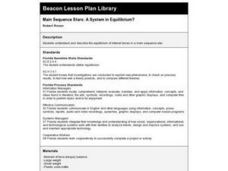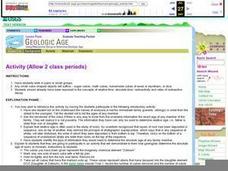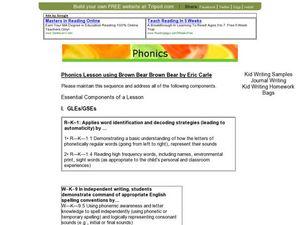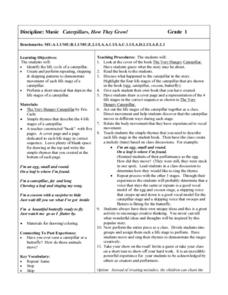Curated OER
Sequencing Time
Students place events in sequence and assign relative times to each event. They gain an understanding of relative and numerical time and become familiar with the methods used by scientists to develop the Geologic Time Scale.
Curated OER
Main Sequence Stars: A System in Equilibrium?
Fourth graders study the equilibrium of internal forces in a main sequence star.
Teach Engineering
Inside the DNA
Get your class to take a closer look at DNA. Pupils conduct research to determine the methods used by scientists to analyze the molecular structure of DNA. The class members investigate different types of molecular imaging along with gel...
Curated OER
Natural Selection.... a Cumulative Process... it's in the cards!
Young scholars working in pairs attempt to produce a full sequence of 13 cards of one suit (ace - to king). This must be done by shuffling the suit of cards for each round, then checking the cards.
Curated OER
Secret Codes
Learners practice writing and decoding secret messages before discussing DNA and its role as a code for making proteins. They translate DNA into RNA and identify the sequence of amino acids to find a secret message. An interactive...
Curated OER
Layers Upon Layers - Lesson Plan
Students study rock layers and the sequence of events that occur when a canyon forms. In this sedimentary lesson students complete a lab while in groups and discuss what happens.
Curated OER
Using Radioactive Decay to Determine Geologic Age
Pupils investigae using radioactive decay to determine geologic age.
Curated OER
Multiplying Microbes
Ninth graders investigate the techniques of culturing bacteria. They culture bacteria using agar plates. Students identify and describe some environmental conditions that effect bacteria growth.
Curated OER
The Martian Dust Devils
In this martian dust devils worksheet, students use images of a dust devil captured by NASA's Spirit rover to calculate the distance the dust devil traveled, the speed, and its acceleration or deceleration.
Curated OER
Brown Bear Phonics
Students listen to Brown Bear, Brown Bear and imitate the style of Eric Carle in writing a sentence. In this writing lesson, students use the beginning and ending sounds of words to write an Eric Carle type sentence. ...
Curated OER
The Formation of Coal
In this coal formation worksheet, students read and informational sheet about coal formation. Students are given 5 short-answer questions regarding what they've read.
Curated OER
The Human Body
Explore the human body through hands-on activities. Young learners will trace their bodies and place cut out body organs in the proper place, print patterns using cut fruit, sing songs about good nutrition, and use their five senses...
GNS Science
Think like a Geologist: 1
How well do pupils play the role of geologist? Test their abilities in the first installment of a two-part series. Presented with a series of rock formation diagrams, learners write stories to match what they see in the diagrams. The...
Curated OER
Music: Caterpillars, How They Grow!
Put on some music and get moving as a way to represent the life cycle of a caterpillar. Kids listen to the story The Very Hungary Caterpillar, discuss the life cycle, then create vocal expression that represent each stage of the cycle....
Curated OER
Relative Age Dating
Modeling dough and paper cutouts in science class? Learn about how relative age dating concepts, like the Law of Superposition and cross-cutting relationships, can be used to describe the formation of sedimentary layers.
Polar Trec
Ice Cores: Modeling Ice Sheets
Ice cores provide scientists with knowledge of historic melt layers, air temperatures, greenhouse gases, and climate stability. Scholars work in groups to build layers representing snow and ice over thousands of years. Then, groups...
Curated OER
Identifying Disease Genes using BLAST
Students navigate the National Center for Biological Information (NCBI) website and BLAST program to conduct a variety of biological assignments.
Curated OER
SDO: Measuring the Speed of an Eruptive Prominence
In this eruptive prominence activity, high schoolers read about a plasma ejection from the sun measured by the Solar Dynamics Observatory. Students solve 3 problems using the given diagrams of the ejection. They determine the scale of...
Curated OER
Dolphins
Students explore sea life. In this cross curriculum fine arts, science, and P.E. "dolphins" lesson, students sing songs and play games about dolphins, perform water experiments, create mosaics, and use their five senses to explore sand...
Curated OER
Butterfly Adventure
Young scholars in second grade are paired with fifth grade computer research buddies. They observe the characteristics of caterpillars, and identify the four stages of the caterpillar to butterfly life cycle. They graph the number of...
Curated OER
Geologic History PowerPoint Follow Sheet-The Rules of the Game
In this geologic history worksheet, students answer questions about the earth's history, about dating fossils, about layers of rocks and about unconformity.
Curated OER
The History of Rock and Roll
Seventh graders examine how the different layers of rock show the history of the Earths surface. In this rock lesson students divide into groups and complete an activity using clay.
Curated OER
What is the Function of Each Seed Part in the Growth of a Plant
Sixth graders investigate the parts of a seed by using a digital camera. For this botany lesson, 6th graders plant their own seeds in class and demonstrate the necessary attributes for growing a plant. Students utilize a...
Curated OER
Who Was Here First? Relative Dating
Students read about and complete question activities for the topic of relative dating. In this relative dating instructional activity, students read information for the topic and then complete two activities to further their...

























